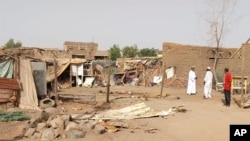Editor's note: Here is a fast take on what the international community has been up to this past week, as seen from the United Nations perch.
Sudan violence continues
Despite a U.S.-Saudi brokered temporary cease-fire, there continues to be violence in Sudan. More than 1.2 million people have been displaced by the fighting that erupted on April 15 between rival generals. The World Food Program says its logistics hub in south-central Sudan was looted this week, jeopardizing food assistance for 4.4 million people in Sudan and South Sudan. Food, vehicles, fuel and generators were stolen in the incident. WFP says it has sustained losses of more than $60 million in supplies and equipment since the fighting started.
Sudanese Army Quits Cease-Fire Talks With Paramilitary Forces
IAEA chief issues principles to keep Ukraine’s nuclear plant safe
The head of the International Atomic Energy Agency said the world is “fortunate” that a nuclear accident has not yet happened in Ukraine and issued a set of five principles to help ensure the safety and security of Europe’s largest nuclear power plant, which is located in the country. “I see these commitments as essential to avoid the danger of a catastrophic incident,” IAEA Director General Rafael Grossi told the U.N. Security Council in a briefing Tuesday about the Zaporizhzhia Nuclear Power Plant.
Meanwhile, the United Nations said Thursday that it is concerned that the Black Sea Grain deal continues to be operating far below capacity, as Russia continues to block usage of one of the three ports authorized under the deal to get Ukrainian grain to international markets. Russia has also slowed the registration and inspection of cargo ships. A U.N. spokesman said Friday, that no ships were inspected on Thursday or Friday this week. Moscow wants access to the Togliatti-Odesa ammonia pipeline, which runs from Russia to the Ukrainian port city of Odessa, to export its ammonia. It accuses Ukraine of adding conditions to make that happen.
VOA’s Eastern Europe Bureau Chief Myroslava Gongadze recently interviewed Ukraine’s Minister of Agrarian Policy and Food, Mykola Solskyi, about the grain initiative:
VOA Interview: Ukraine Food Minister
In brief
— On Thursday, the General Assembly approved by consensus Dennis Francis of Trinidad and Tobago to be president of the 78th session of the General Assembly, which will begin in mid-September. The veteran diplomat is the current ambassador for his nation at the United Nations. He has represented his Caribbean Island nation at the U.N. in Geneva and Vienna.
— Celeste Saulo was appointed secretary-general of the World Meteorological Association on Thursday. The Argentine is the first woman to head the Geneva-based body. She received the necessary two-thirds of the votes from delegates at the quadrennial World Meteorological Congress, the top decision-making body of the organization. Saulo has been director of the National Meteorological Service of Argentina since 2014 and is currently the First Vice President of WMO.
— The World Food Program is urgently appealing for $50 million to restore the value of monthly food vouchers to Rohingya refugees in Bangladesh to $12 per person. In March due to funding gaps, WFP reduced the voucher from $10 to $8 per person – less than 9 cents per meal. This was the second time the food agency had to cut rations in just three months. Nearly a million Rohingya refugees depend entirely on assistance to meet their basic needs.
— The U.N. Relief and Works Agency for Palestine Refugees, UNRWA, is facing an existential financial crisis this year, Commissioner-General Philippe Lazzarini told a pledging conference Friday at U.N. headquarters. He said the agency, which often faces critical funding shortfalls, was facing financial collapse, and appealed for at least $150 million to keep its 700 schools, food programs and health care centers running until the end of this year. The United States, which is UNRWA’s largest donor, came through with $153.7 million. Canada also stepped up with $100 million payable over the next four years. UNRWA has been assisting millions of Palestinian refugees in the occupied territories, Jordan, Lebanon and Syria for 75 years.
— Secretary-General Antonio Guterres expressed his deep concern Wednesday about Uganda’s president signing the Anti-Homosexuality Act of 2023, which opens the door for long prison sentences and a possible death penalty for consensual same-sex acts between adults. Guterres’ spokesman said the law raises the risk of worsening the existing violence and persecution against lesbian, gay and bisexual people in Uganda. Guterres urged all countries to abide by their obligations under international human rights law and to end the criminalization of consensual same-sex relations.
Good news
On Tuesday, the United Nations announced that it has begun a salvage operation in the Red Sea to remove more than 1 million barrels of oil from an old and decaying supertanker anchored off Yemen. The U.N. has been raising the alarm for more than two years about the vessel, but it has been difficult to reach because of Yemen’s civil war. It has been gathering the resources for the massive operation to transfer the oil from the FSO Safer to a salvage vessel, and then towing the Safer to port for cleaning and recycling. Now the first phase will begin. The U.N. has raised $114 million for the operation but still needs $29 million more to complete the operation.
What we are watching next week
The U.N. Security Council will elect five countries on Tuesday to two-year terms on the 15-nation council. Only one of the regional groups is running a contested race. Belarus is up against Slovenia. In the African group, Algeria and Sierra Leone are uncontested in their bids for two available seats. In the Asia-Pacific group South Korea is running, and in Latin America and the Caribbean, Guyana is the sole candidate. There is no available seat this year in the Western Europe and Others Group (WEOG). The winners will serve from January 1, 2024, through December 31, 2025.




